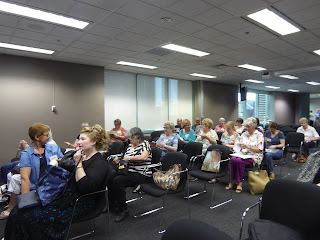Still Pondering My Status As An Australian Updated
Back in November, last year, posted this piece, very tounge in cheek, as to wether I was really a Pom.
http://researchbylily.blogspot.com/2017/11/pondering-my-status-as-australian.html
I contacted Family Wise Ltd [https://family-wise.co.uk/ ] and asked them to look into it for me. Here is their reply,
"Following a conversation with the Home Office this morning, it depends on your father’s nationality at the time of your birth. If he was born a British citizen, you would be considered British by descent but only if your father was still a British citizen when you were born."
Now I have to contact the Department of Home Affairs and see what they say.
What started as a bit of curiosity, is now something I really want to find out.
Watch this space!
Just a recap, for those who didn't see the original post.
My Dad was born in 1896, when New South Wales was still a British Colony.
While it was called Australia, it didn't become federated until 1901.
See my dilemma?
Bye for now,
Lilian.
Below is a copy of the National Archives of Australia Fact Sheet, 187. This might help solve the dilemma.
Citizenship in Australia – Fact sheet 187
History of Australian citizenship
At Federation in 1901, ‘British subject’ was the sole civic status noted in the Australian Constitution. The Australasian Federal Convention of 1897–98 was unable to agree on a definition of the term ‘citizen’ and wanted to preserve British nationality in Australia. An administrative concept of citizenship arose from the need to distinguish between British subjects who were permanent residents and those who were merely visitors. This was necessary for the Commonwealth to exercise its powers over immigration and deportation. Motivated by the nationalism of Arthur Calwell, the Minister for Immigration 1945–49, this administrative concept was formalised in the Nationality and Citizenship Act 1948. In 1958 the Act was amended so that naturalisation could only be revoked if obtained by fraud. This prevented a naturalised person being stripped of citizenship and deported.
Throughout the 1960s, Australian citizens were still required to declare their nationality as British. The term ‘Australian nationality’ had no official recognition or meaning until the Act was amended in 1969 and renamed the Citizenship Act. This followed a growing sense of Australian nationalism and the declining importance for Australians of the British Empire. In 1973 the Act was renamed the Australian Citizenship Act. It was not until 1984 that Australian citizens ceased to be British subjects.
The records
The relationship between citizens and government is blurred by the absence of a clear definition of Australian citizenship, its rights and obligations. Relevant records are spread widely across government agencies covering activities such as immigration, passports, franchise, jury service, public service employment and social security.
Reflecting this, the records held by the National Archives cover a range of issues such as: the legal and constitutional meaning of citizenship; naturalisation; ceremonies; promotional activities; civic identity of migrants, aliens, Aboriginal people, non-Europeans and women; rights and obligations of citizenship; travel and passports; and international human rights.
Most records take the form of case files or policy files and include correspondence, reports, newspaper clippings, and bills introduced into Parliament.



Comments
Post a Comment